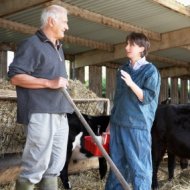Device could allow vets to diagnose bTB in minutes

Vets on farm visits could use the device to detect bTB from a simple blood test.
UK scientists are working on a portable testing device that will be able to detect bovine TB (bTB) in cattle in just a few minutes.
Current tests can take up to a week to detect the disease, involving two separate skin tests by a veterinary physician, followed by further analysis in a laboratory.
The development is part of a £1.1million collaborative study involving Nottingham Trent University (NTU), Public Health England and other partners.
About the size of a smartphone, the device could be used by veterinary surgeons to give an almost immediate diagnosis from a blood test on farm visits.
As a result, key decisions such as whether to isolate, vaccinate or cull a herd could be made earlier before the disease spreads further.
Professor Graham Ball from NTU's School of Science and Technology said: "Bovine tuberculosis is a growing challenge, the disease can spread quickly and easily in the time it currently takes to get a definitive result."
Scientists say the device could be important in offering reassurance to farmers about the health of their cattle before they sell beef or milk.
Reducing the level of bTB in the environment may also help to resolve TB problems in badger populations, thereby reducing the need for culling, scientists say.
The three-year study will involve identifying molecules in the blood that indicate the presence of bTB. This could help with spotting the disease from a blood test rather than relying on time consuming skin tests.
Furthermore, scientists say the new test would be more cost-effective. With no need for repeat testing, diagnosis could be made with just one visit from a vet. By correctly identifying infected animals, there could also be a reduction in the amount paid out in compensation to farmers.
Professor Ball said: "Our system would provide major benefits to farmers in terms of herd management and isolation of bovine TB cases. And the economic benefits to the country, specifically through the reduction of testing, analysis and compensation costs are potentially huge."
As bTB is a "notifiable disease" - meaning cases must be reported by law - the new device would automatically feed information about tested cattle into a central database.
Between January and August last year, more than 22,000 cattle were slaughtered due to bTB. The disease has cost the taxpayer £500 million over the past 10 years.



 The latest
The latest